
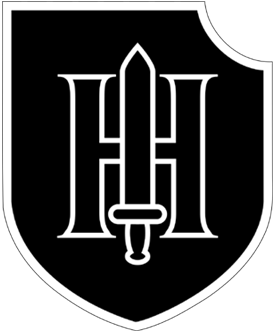
Interview with Eberhard Telkamp, winner of the Knight's Cross and Regimental Commander of the 9. SS-Panzer Division 'Hohenstaufen', Lake Schwaltenweiher, 1988.
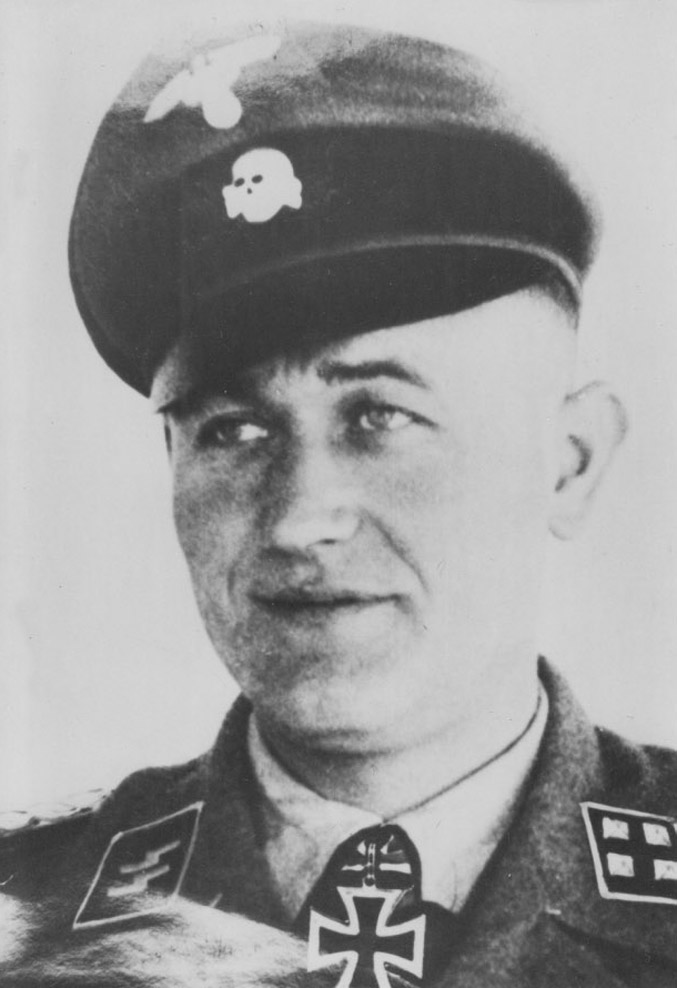



Interview with Eberhard Telkamp, winner of the Knight's Cross and Regimental Commander of the 9. SS-Panzer Division 'Hohenstaufen', Lake Schwaltenweiher, 1988.


Thank you agreeing to meet me, as we discussed I would like to ask some
questions for my research. I would like to start by asking you why you chose
to join the SS?
Eberhard: Yes, thank you for indulging an old man. I would like to say I came
to the SS because it was seen, in those days, as loyal fighters of the utmost
character. To enter the SS-VT you had to be a political fighter and want to
fight for the new Germany. I was an early member of the HJ then, and I
longed to come to the SS-VT when I could.
I was a very early member of the SS as well; I came to the SS in
1933, to the 24. SS-Standarte. Back then there was not a strenuous entrance
exam; one had only to be loyal to the Führer and want to be a part of what
he was building. Himmler was our top leader and spoke often about how he
would transform the SS into an ideal that all Germans would be proud of.
Only in the SS could a common man work his way up and prove
himself to become an officer. In the Army your station or education dictated
who could become an officer. This is a subject the Army chided us over and
does so today. The SS took your skills and mind and used it to judge if you
were a leader. To become an officer in the SS was the pinnacle of
achievements.
You see, to be in the SS back then was not a bad thing; it was seen
as being a part of the most prestigious group in Germany. If you wanted any
position in government, the SS was a good pathway to get there. I must say
to you also that you did not have to be a party member to be in the SS, which
is a lie perpetuated today.
While many in Germany supported the party, very few actually
became members, to do so would mean paying dues, and to volunteer time to
help with functions. Many people just did not have time to do so. I never had
the time to join the NSDAP, which ended up helping me after the war.
How did you feel when Poland was attacked, and war was declared?
Eberhard: To be frank, I was glad at the time. You see, as Germans we had a
very bad feeling about what happened after the first war. We as a nation had
to shoulder the blame for the war and so lost large areas of land. Trade was curtailed, the winners occupied parts of the land, and the nation had to pay
billions.
This left bad feelings and to add to this Poland and the Baltics were
created as free nations, and then plunged into revolutions. Poland attacked
parts of our borders to take more than what was handed to them. Our
Freikorps stopped this with brutal force, I heard some of the stories the
veterans told. The Bolsheviks were involved in many of these revolutions and
took a terrible toll on the people who opposed them. On the border there were
innocent people who were shot down, some by Polish nationalists.
This made many Germans angry at Poland, and work on ways to
have our taken lands returned. This was the Führer’s program, and all
Germans stood behind this platform, to reunite German lands. I can say to
you as well, that I knew of people who fled away from Poland, saying they
had been attacked and abused simply due to being Germans and wanting to
reunite with their land.
So, you see there was an air of hatred between our nations, and
Germans wanted to right a wrong. When it was announced that we attacked
Poland, it was with a sense of vengeance that we would be able to settle the
issues we have been having with them. It is sad it came to war, but we had to
speak to Poland in the language they were using towards us.
When did you first get to see action against the enemy?
Eberhard: That would have to be in 1940, when I was an SS-Untersturmführer, having my commission on the 9th of November. I was
first with the artillery battalion when we had to go into France to fight. I
remember it was hard fights with the French, they had a very large army, and
we were called on to break up many attacks and defenses.
For these I was awarded both classes of the Iron Cross I will tell
you. The fighting was that hard. There were times we wondered if the battle
was lost, as the French dealt some blows to German units that almost broke
our lines. The French are often thought of as not being good fighters, this is
not true.
How did you come to the assault gun section of Das Reich?
Eberhard: And so, it was because I was in the artillery. You see there is a
misconception amongst many foreign historians. They think the assault gun
was part of the Panzers, this is false. We were really part of the artillery. This
is how I was offered a chance to attend the assault gun class, we were in
Juterbog [a town in north-eastern Germany].
The assault guns were meant to work with infantry to break open
fortifications. We were not to be used as tank hunters until later in the war,
and it was by accident. These weapons proved to be very effective against
Soviet armor and so they kept improving. The Stug was one of the most
effective anti-tank weapons ever.
There are new modern versions used by the armies of the world that
owe their creation to us. Did you know the Allies took all the patents and
inventions we had, and used them without credit? This was a great theft but
all part of war.
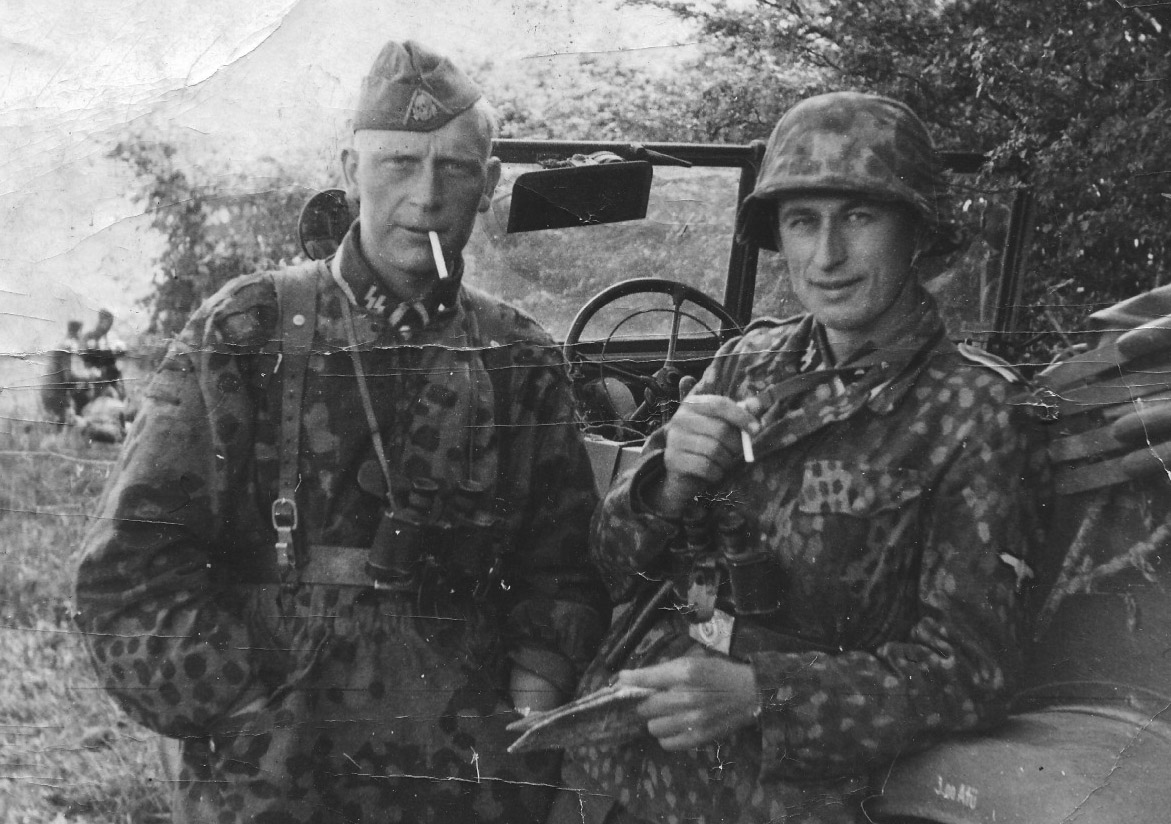
[Above: Two suave SS commanders.]
Why did Germany invade Yugoslavia and the Balkans?
Eberhard: That is a tricky situation; it was not an invasion like you say. Two
reasons why Germany acted were an English invasion of Greece, and a coup
in Yugoslavia. There was a contingent that wanted German friendship and
asked Hitler to intervene, as well as Mussolini asking for help against Greece.
It was a two-fold benefit for us; we would aid allies and restore order. It is
not true the people opposed us, the fighting was non-existent until units
arrived at the Greek border, then they fought hard until broken. While it is
true Belgrade was bombed, it was made a fortress, and a fair target. This
broke the will to fight of a small clique.
The LAH met the English and routed them while being
outnumbered; I remember the radio telling us that. Many SS men received the
Knight's Cross for daring acts during this quick campaign.
What was the Eastern Front like for you, and what did you think about the
Russian soldier?
Eberhard: Oh, the east was a vast front with little fighting at first. We had the
Russians in retreat and they retreated faster than we could advance. You see
Stalin used scorched earth, where he burnt down the major areas we needed,
so it slowed our supplies. I want to tell you that is why winter uniforms were
late to come to some units; the supply situation was terrible that first year.
You might be surprised that the civilians who stayed behind
welcomed German units as friends. They were able to keep us going at times
by giving intelligence on the Russians, and water. We even stayed with
people when we could, of course we had to sometimes requisition their huts,
but they did care usually.
I will share with you, once during the battle for Losza, a man warned
us about hidden Russian units, and we defeated them by a surprise attack to
free one of our units. I tell you as the people were against the Red soldiers, the Reds had been very hard on their people and they revolted in the only
way they could, by giving us help.
Now as far as the Russian soldier, he was a soldier defending his
country. He was fierce, tenacious, and tricky. They would pretend to be dead,
and then attack us from behind. When we came to a battle, and saw fallen,
some would shoot them to make sure they were dead and not pretending.
Sadly, this caused some wounded to be shot, as they were motionless when
German units went by. I saw this once in front of us, a KV1 was silent and
had a lost track, it showed a white flag. As we approached it came to life and
fired but missed.
We returned fire, hitting it in the side and brewing it up. You always
had to be mistrustful and always be alert. I always told my crew to be a
wooden eye and not blink.
Did you see any abuse of Russians, either civilians or prisoners?
Eberhard: I do not know how to answer, I saw some pushing and rough
treatment of both, and it was war. There were times when some people were
against us and had to be questioned. There were times some prisoners did not
want to move or obey orders. I will say to you one flaw of the Red Army is
that the soldiers did not seem disciplined at times.
One time I can share with you, we had captured a position with
prisoners, and while being searched one refused to let the soldier into his
pocket. Due to this he was hit to the ground and started bleeding from his
nose. Our men got control and restored order; I did not have to get involved.
From what I saw in the east, we treated everyone as they treated us.
If we were in a friendly area with no problems, then the people did
well with us and enjoyed our company. In areas that had partisans the people
were viewed with suspicion and caution. This angered some but we wanted
to go home to our families so if hurting their pride had to be done, then we
did it.
Today the Soviets tell great stories about the suffering of the people
that we caused. I do not believe this for one moment. If you had been there
you would understand, the people were kind and we returned their kindness.
The only ones who had to fear were the partisans that worked behind the
lines.
They are a whole different story and lucky for us we did not have to engage
with them until at war's end. The Soviets sent them behind the lines to form
bands to attack weak rear area units. They are known to us to be very cruel
and inhumane against their enemies, who could be Germans and anyone
helping us.

[Above: Cuff title of Hohenstaufen.]
You won the Knight's Cross; can I ask what did you do to win this award?
Eberhard: Yes, my award for the Knight's Cross came in Normandy, and at
this time I was assigned as Panzer leader in Hohenstaufen. We had been
engaged against the British who came at our lines with massed armor attacks
often. Because of the hard defense we put up, my unit was credited with
knocking out over 100 tanks.
This is testament to the bravery of my men, who held out in spite of
being outnumbered and under supplied. Many think we were a large
juggernaut with unlimited men and material, this was not the case. It applies
to the Allies more than Germany. In Normandy we were outnumbered,
outgunned, and outmatched from the first day.
Due to indecisions by the army command we lost precious time in
arriving to the beaches, and this cost us the battle. It is easy to judge after the
event, but all SS Generals agreed that Normandy was the clear choice for the
invasion, and our forces should have been deployed there.
When the Allies landed only a few foreign battalions opposed them,
save for the German strongpoints, which were few and far between. It is
testament to the fighting ability of the German soldier that such casualties
were given to the Allies that day. They paid dearly for every metre of land
they took. If only the SS units were there on the first day, the invasion would
have failed I can promise you.
I wanted to take my unit to the coast and shell the ships, but that was
impossible by the time we arrived. On our trip moving to Normandy we were
attacked by the jabos and between those attacks and failures of machines it
took us till the end of June. By then the Allies had moved well inland and
established themselves.
And so, while I was awarded this high award, it came as a bitter sweet moment, as I knew the war was now lost.
Many veterans have told me they knew it was lost after Normandy, why did
Germany keep fighting?
Eberhard: It is what we had to do, the Allies demanded unconditional
surrender which meant if we gave up they dictated the peace. From the way
the Allies had so far conducted the war, we had no interest in submitting to
their revenge. We owed the nation and our Führer our loyalty and resolve.
We were soldiers so we had to do our duty no matter how bleak the
situation was, we had to keep going. It is just the way it had to be, many
Germans understood what was at stake and what the future would hold if we
failed. That is how we thought back then, and it is good the Allies allowed us to return as a nation. It seems silly to some that we kept on fighting, but many
of us knew what we were doing.
What was the end of the war like for you?
Eberhard: My division was sent to relieve Budapest in the spring awakening
which failed. We caused the enemy severe losses but could not break their
lines, they had unlimited reserves. We took many prisoners who were not fast
enough to retreat, these men were only prisoners for a short time and then let
go.
We knew it was over, and we only wanted to slow the enemy to
allow as many refugees to get to the Reich. In this area they clogged the roads
and made the going hard for us. Trying to get large Panzers through only
made them sitting ducks for the Jabos. Sadly many civilians who refused to
leave the roads were targeted by them too.
We were forced into the Reich and by April we came into American
lines where the war ended. I will tell many of our brothers endured the worst
after the war, simply for being SS men. We were stripped of rank and medals,
beaten and spit on, it was shameful.
The Americans allowed many former German Jews to enlist as
interrogators, and many abused their authority.
As an officer from the Waffen-SS, do you see any myths you believe should
be corrected?
Eberhard: Yes, and I will tell you something I saw on the news yesterday. It
was said that German soldiers were shot down by their officers if they refused
to carry out an order, this is not so. A supposed army veteran said this and it
is false. If an order was given and a soldier believed it was wrong he could
appeal to a higher up, even a court of honor.
He said he had to carry out shooting a partisan, yet he is lying. If
one was assigned to a detail, which was rare, he could have asked to be
dismissed. There were indeed times when looters, deserters, and cowards
could be shot, but the police units usually supplied the punishment detail.
Very rarely were combat units used to punish unless it was soldier
from their regiment who deserted, then they had the option to let comrades
give the punishment. Also, I should like to challenge the claims that we were
criminals, this is false and war propaganda.
Our honor was never tainted and we fought a hard war that caused
us to retaliate with hard reactions, but not criminal. Hohenstaufen was free from accusations and so we were not tried for claims. Reich men were tried
for actions in France, but I heard from witnesses there were no crimes.
Our enemies feared us for our determination and conviction; the
civilians got along well with us on all fronts and had nothing to fear from the
Waffen-SS.
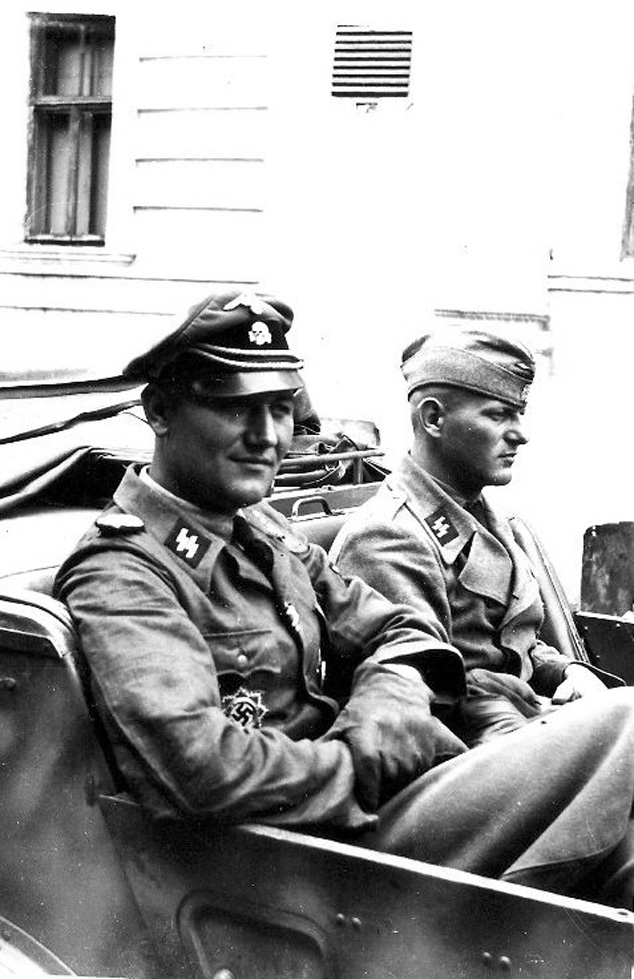
[Above: Eberhard Telkamp (left).]
[Above: Eberhard Telkamp.]
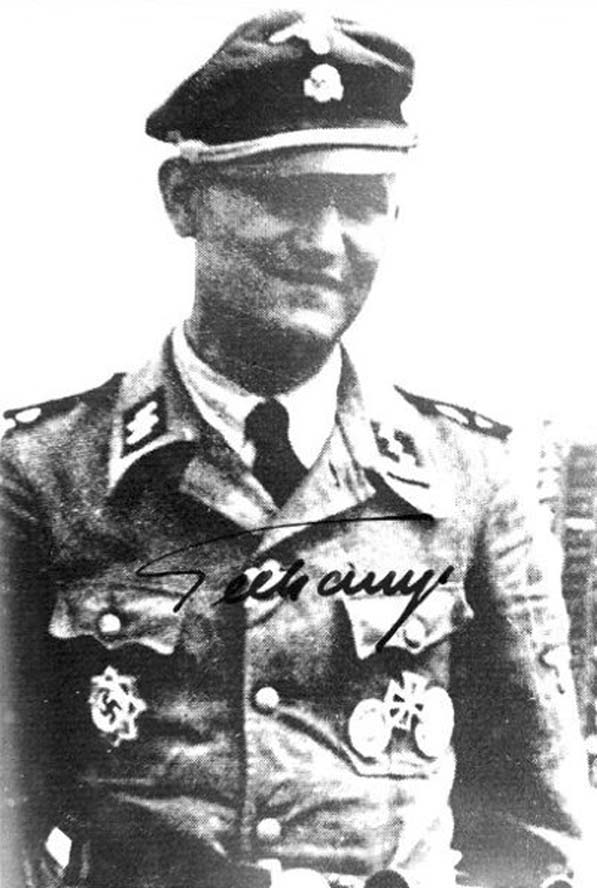
Back to Interviews